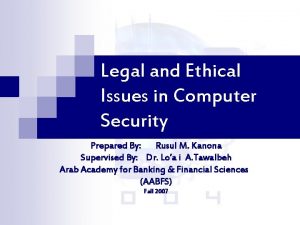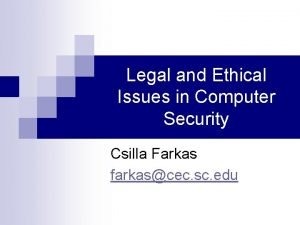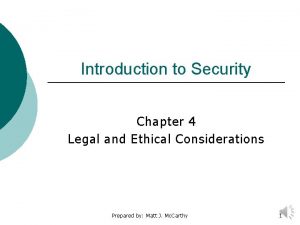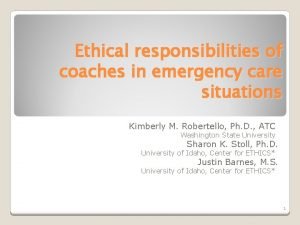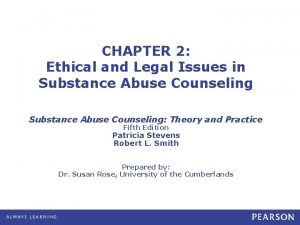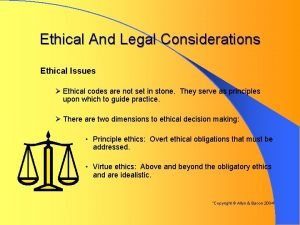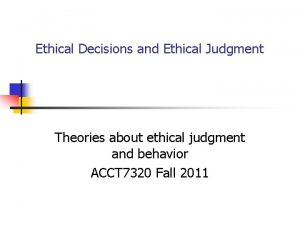Animals on Campus Ethical Legal and Logistical Considerations

































- Slides: 33

Animals on Campus: Ethical, Legal, and Logistical Considerations A HEMHA Guide 2020 ACCA Annual Conference; Washington, DC HEMHA Representatives Kathryn P. Alessandria, Ph. D. (ACCA) Chris Corbett, Psy. D. (ACCA) Shari Robinson, Ph. D. (American Psychological Assn. ) Stephanie Mc. Iver, Ph. D. (AUCCCD)

Learning Objectives: 1. Gain awareness of what the Higher Education Mental Health Alliance is and how to access the free resources it provides; 2. Be able to identify logistical and ethical dilemmas related to animals on campus; 3. Understand the differences between service animals, therapy animals, and emotional support animals and the current regulations related to each. 4. Discuss their own experiences with animals on campus.

• • • American Academy of Child and Adolescent Psychiatry American College Counseling Association American College Health Association ACPA: College Student Educators International American Psychiatric Association American Psychological Association for University College Counseling Center Directors NASPA - Student Affairs Administrators in Higher Education The Jed Foundation

Higher Education Mental Health Alliance • Formed in 2008 under the leadership of ACHA • Consists of a partnership of organizations providing leadership to advance college student mental health

HEMHA: An Alliance of Inter. Association Partnership ● History-Charter meeting on Sept. 26, 2008 ● Nine Charter organizations ● Mission: provide leadership through a partnership of orgs to advance college mental health. ● Virtually managed infrastructure: monthly conference calls, annual business meetings, group consensus, email communications, and conference presentations

HEMHA Resources

Tailoring the presentation. . . What brought you to this presentation?

Current HEMHA Project: Animals on Campus Purpose : ● Provide educational information, including background information, definitions of terms and types of animals on campuses, and review the current literature on this topic. ● Help engage mental health professionals and campus administrators in discussions about medical, legal, and ethical aspects of this topic in order to develop appropriate policies and procedures on their campuses. ● Outline several areas to consider re: animals on campuses, and illustrate with case examples. ● Connect readers to resources on the topic of animals on campuses, especially ESA’s.

Animals on Campus Limits on the guide’s scope: ● NOT intended to: ○ serve as best practices guidelines or ○ instruct or advise a campus on this topic. ● The scope is educational and meant to: ○ encourage further dialogue among mental health professionals and campus stakeholders on campuses, ○ inform stakeholders so that each campus can develop policies that are appropriate to their setting, mission and student population.

Content Overview ● ● ● ● ● Background: Definitions Review of current literature and research What are the considerations for an institution? Diagnostic/Counseling Aspects Legal Aspects Review of relevant laws and legal cases to be aware of Potential problems, including ethical issues Case studies

Pet “A domestic or tamed animal kept for companionship or pleasure. ” Oxford Dictionaries https: //en. oxforddictionaries. com/definition/ pet

Therapy Animal “Therapy animals…provide affection and comfort to members of the public, typically in facility settings such as hospitals, assisted living, and schools. These pets have a special aptitude for interacting with members of the public and enjoy doing so. ” Pet Partners, Industry Terms https: //petpartners. org/learn/terminology/

Emotional Support Animal “An assistance animal is an animal that works, provides assistance, or performs tasks for the benefit of a person with a disability, or that provides emotional support that alleviates one or more identified effects of a person’s disability. An assistance animal is not a pet. ” HUD - retrieved February 14 th, 2020 https: //www. hud. gov/program_offices/fair_housing _equal_opp/assistance_animals

Service Animal “Service animals are defined as dogs that are individually trained to do work or perform tasks for people with disabilities … The work or task a dog has been trained to provide must be directly related to the person’s disability. Dogs whose sole function is to provide comfort or emotional support do not qualify as service animals under the ADA. ” Revised ADA requirements. U. S. Department of Justice, Civil Rights Division. Disability Rights Section https: //www. ada. gov/service_animals_2010. htm


Is this Animal Allowed on Campus? Fluffy is a 7 year old cat, her owner, Calista got her as a kitten when her parents divorced when she was 13; Fluffy has been a constant comforting presence. When leaving for college, neither parent was willing to take custody of Fluffy and Calista felt she would need Fluffy’s support at school. She found an online therapist and was able to get Fluffy designated as an Emotional Support Animal. They live in a co-ed residence hall in a suite-style situation. ● Where on campus can Fluffy go with Calista? Calista is thinking of moving off campus next semester, but most places do not allow pets. ● Does Fluffy’s ESA status offer any workaround for these policies?

Ethical Issues & Concerns on Campus ● ● ● Role conflicts Competence Risk to therapeutic alliance Objectivity Comprehensive Vicarious liability (animals in lab? )

ACA HAIC Position Statement on ESAs ● The HAIC recommends that professional counselors do not engage in the practice of writing ESA support letters for clients, unless counselor has specialized training and experience in working with human-animal bond in counseling such as would be outlined in the ACA AAT-C Competencies for ESAs due to the potential risks involved for clients, the public, the counselor, and the animal. ● The ACA Code of Ethics C. 2. a Boundaries of Competence states that counselors only work within their boundaries of competence based on education, training, supervision, experience and credentials. As Licensed Professional Counselors, the assessment of DSM 5 diagnoses for human clients is within the scope of practice; however, the added practices of animal behavior, behavior assessment or Human. Animal Interventions are (most often) not. From: 3/20/19 Human Animal Interest Network in Counseling (HAIC) Emotional Support Animals Position statement, counseling. org.

APA Considerations for ESAs • Policies must balance the needs of patients with the impacts ESAs might have on the general public, providers assessing patients, and the animals themselves. • Psychologists must fully understand how it may alter their role as a provider and set clear expectations for patients prior to undergoing any examination to determine whether evaluation and research is substantial enough to justify a letter of support. • Clients must be informed that evaluation may not support the request for an ESA and any letter may not supercede laws, policies pertaining to animals. • Unlike service animals, ESAs are not trained to assist individuals and were not selected based on temperament. As a result, ESAs may be in situations where they could interfere with the duties of a trained service animal, cause distress for members of the public, and/or be exposed to detrimental stressors. • There may be confusion or concerns amongst the general public who are unfamiliar with having ESAs in their presence. Policies and guidelines must be clear to ensure public safety and animal wellbeing. https: //www. apaservices. org/practice/good-practice/emotional-support-animals. pdf

Relevant Laws • • • Americans with Disabilities Act Rehabilitation Act of 1973, Section 504 Fair Housing Act Air Carrier Access Act State Laws

Ethical vs. Legal Issues Disability is a legal concept: • It is based upon six federal laws that have differing definitions. • Consequently, for a mental health professional working with a patient, disability is not just a matter of discomfort, but a psychological disorder or problem that interferes with the patient’s ability to perform major life activities.

ADA Definition of Disability Sec. 12102. Definition of disability (1) Disability The term "disability" means, with respect to an individual (A) a physical or mental impairment that substantially limits one or more major life activities of such individual; (B) a record of such an impairment; or (C) being regarded as having such an impairment (as described in paragraph (3)). Americans With Disabilities Act of 1990, Pub. L. No. 101 -336, 104 Stat. 328 (1990).

How to evaluate for ESA accommodation(s)? Younggren, Boness, Bryant and Koocher (in press): ● A formal disability evaluation consistent with legal definitions of disability. ● A thorough understanding of the laws that impact ESAs. ● An evaluation of the animal’s ability to perform the function consistent with the animal’s abilities and temperament. ● An evaluation of the interaction of the animal with the owner to support claim of amelioration.

Recommendations for ESA Policy ● IHEs must establish policies clearly outlining both the institution’s and student’s right and responsibilities ● ESA policy should be comprehensive ● ESA policy should be reviewed and updated to reflect recent case laws ● Collaborative Stakeholders: CSAO, General Counsel, Directors of Accessibility, Residence Life, EEO, Counseling Center, Housing/Facilities, DOS

Recommendations for ESA Policy ● Define each office role, who needs to agree on the policy and who has final sign off authority. ● Clearly outline the appeals process which is no different for other accommodations decided on case by case basis ● Clearly articulate general responsibilities of individual with an approved ESA ● Clearly articulate when the university may required the owner to remove the ESA from housing ● Obtain a signed release of information and consent form

Sample ESA Policy UC Irvine http: //www. policies. uci. edu/policies/pols/50 1 -05. php What policies, if any are in place on your campuses?

Legal Precedents Michigan Bills HB 4910 -4911 - To validate an emotional support animal, the health care provider would have to be practicing in Michigan for at least 180 days and have an office located in the state. They also would have to provide a notarized letter saying they had been treating the pet owner for at least six months. Penalty for fraud 90 days in jail and/or $500 fine.

Legal Precedents • • University of Nebraska – Kearney Kent State University Alert Barking Service Dog Access in Schools

Case Study Cassie lives on campus at State University with Clementine, her ESA cat and Molly, her roommate. Cassie has severe anxiety; Clementine’s presence brings her great comfort. Lately, Molly has noticed Clementine’s litter box is full and she’s begun making messes outside the box. The litter box smells have become overwhelming. Cassie has not attended class for weeks. Yesterday Clementine scratched Cassie on the face when she tried to rouse her from bed to feed her. Molly is unsure whether Cassie is feeding Clementine and is becoming concerned for Clementine’s welfare. Molly called the Counseling Center to express concern for Cassie and complained to the RA about the smell and Clementine’s wellbeing. ● ● ● What issues do you see? Should Cassie be allowed to keep Clementine on campus with her? Discuss the complicating factors in this situation. Does your response change if you were the professional who wrote the ESA approval letter?

Current Issues & Trends: Recent ACCA Listserv Requests re: AAT ● Does your Counseling Center have an Animal Assisted Therapy program? ● If so, is your institution affiliated with Therapy Dogs International or Alliance of Therapy Dogs? ● What policies and procedures are required when a therapy dog is on campus or in the Counseling Center Interacting with students? Do Students need to sign a waiver before the interaction with the dog?

Soliciting Feedback for the Guide ●What is your experience with animals on campus? ○ Does your institution allow animals on campus? ○ Which types and under what circumstances? ○ What have you seen as the benefits and/or challenges? ○ Who is involved with resolving these issues on campus (stakeholders)? ● ISSUES THAT SHOULD BE ADDRESSED IN NEW GUIDE? ● Ethical and legal issues that have come up on campus or are concerning to you?

References & Recommended Readings ○ Adams, A. C. , Sharkin, B. S. , & Bottinelli, J. J. (2017). The Role of Pets in the Lives of College Students: Implications for College Counselors. Journal of College Student Psychotherapy, 31(4), 306 -324. ○ American Counseling Association Human Animal Interventions in Counseling Interest Network (March 20, 2019). Emotional Support Animals Human Animal Interventions in Counseling Interest Network Position Statement. ○ Americans With Disabilities Act of 1990, Pub. L. No. 101 -336, 104 Stat. 328 (1990). ○ Daltry, R. M. (2018). Embedded therapy dog: Bringing a therapy dog into your counseling center. Journal of College Student Psychotherapy. https: //doi. org/10. 1080/87568225. 2018. 1544841 ○ Daltry, R. M. , & Mehr, K. E. (2015). Therapy dogs on campus: Recommendations for counseling center outreach. Journal of College Student Psychotherapy, 29(1), 72 -78. 1080/87568225. 2015. 976100 ○ Education Advisory Board. (2019). Essential elements for your ESA policy: EAB’s emotional support animal policy template ○ Stewart, L. A. , Chang, C. Y. , Parker, L. K. , & Grubbs, N. (2016). Animal-assisted therapy in counseling competencies. Alexandria, VA: American Counseling Association, Animal-Assisted Therapy in Mental Health Interest Network. ○ Stewart, L. A. , Dispenza, F. , Parker, L. , Chang, C. Y. , & Cunnien, T. (2014). A pilot study assessing the effectiveness of an animal-assisted outreach program. Journal of Creativity in Mental Health, 9(3), 332345.

References & Recommended Readings ○ U. S. Department of Transportation (2020). Service Animals (Including Emotional Support Animals) https: //www. transportation. gov/individuals/aviation-consumer-protection/service-animals-includingemotional-support-animals ○ U. S. Department of Transportation (Feb 5, 2020). Traveling by Air With Service Animals (14 CFR Part 382) , Federal Register (85)24, 6448 -6476. https: //www. transportation. gov/sites/dot. gov/files/202002/Service%20 Animals%20 -%20 NPRM. pdf ○ Wisch, R. F. (2019). FAQs on Emotional Support Animals. Michigan State College of Law: Animal Legal and Historical Center. https: //www. animallaw. info/article/faqs-emotional-support-animals#s 1 ○ Younggren, J. N. , Boness, C. L. , Bryant, L. M. , & Koocher, G. P. (in press). Emotional support animal assessments: Toward a standard and comprehensive model for mental health professionals. Professional Psychology: Research and Practice. ○ Younggren, J. N. , Boness, C. L. , & Boisvert, J. A. (2016). Examining emotional support animal and role conflicts in professional psychology. Professional Psychology: Research and Practice, 47(4), 255 -260.
 Writing strategies and ethical considerations
Writing strategies and ethical considerations Quasi experimental design ethical issues
Quasi experimental design ethical issues Positivism vs constructivism
Positivism vs constructivism Ethical considerations examples
Ethical considerations examples Example of ethical consideration in research
Example of ethical consideration in research Practical/logistical issues in relationships examples
Practical/logistical issues in relationships examples Population examples biology
Population examples biology Logistical integration
Logistical integration The writer properly quotes and cited sources in some places
The writer properly quotes and cited sources in some places Ethical and professional issues in information security
Ethical and professional issues in information security Ethical decision making and ethical leadership
Ethical decision making and ethical leadership Legal issues of ict in education
Legal issues of ict in education Dho chapter 5 legal and ethical responsibilities
Dho chapter 5 legal and ethical responsibilities Ethical issues in ecommerce
Ethical issues in ecommerce Legal and ethical issues in computer security
Legal and ethical issues in computer security Professional and ethical issues during internship
Professional and ethical issues during internship Chapter 2 ethical and legal issues
Chapter 2 ethical and legal issues Medical legal and ethical issues chapter 3
Medical legal and ethical issues chapter 3 Chapter 2 legal and ethical aspects of nursing
Chapter 2 legal and ethical aspects of nursing Legal and ethical issues chapter 3
Legal and ethical issues chapter 3 Legal and ethical responsibilities chapter 5
Legal and ethical responsibilities chapter 5 Chapter 5 legal and ethical responsibilities key terms
Chapter 5 legal and ethical responsibilities key terms Ethical issues in computer security
Ethical issues in computer security Legal and ethical issues chapter 5
Legal and ethical issues chapter 5 Chapter 3 legal and ethical issues
Chapter 3 legal and ethical issues Chapter 4 legal and ethical responsibilities
Chapter 4 legal and ethical responsibilities Legal and ethical responsibilities of a coach
Legal and ethical responsibilities of a coach Chapter 6 legal and ethical issues
Chapter 6 legal and ethical issues Legal and ethical issues chapter 5
Legal and ethical issues chapter 5 Chapter 2 ethical and legal issues
Chapter 2 ethical and legal issues Ethical and legal issues chapter 2
Ethical and legal issues chapter 2 Chapter 5 legal and ethical responsibilities worksheet
Chapter 5 legal and ethical responsibilities worksheet Ethical and legal issues affecting the nursing assistant
Ethical and legal issues affecting the nursing assistant What is the difference between ethical and legal issues
What is the difference between ethical and legal issues














